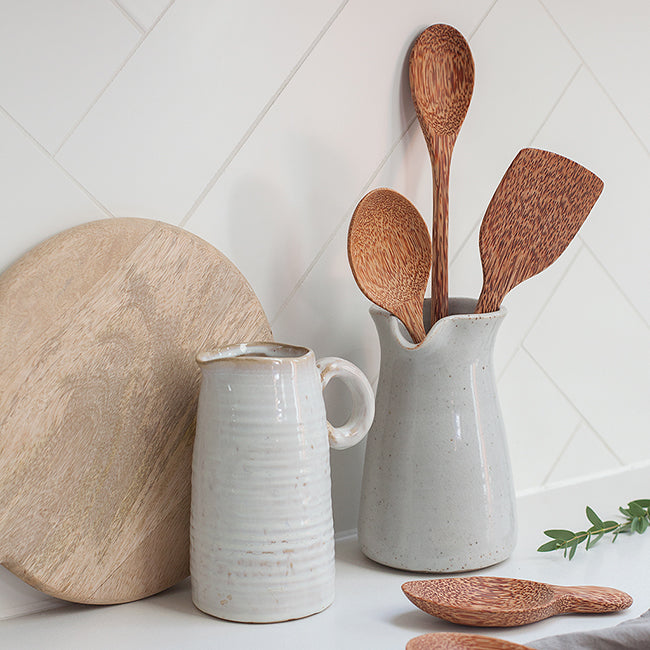
Wooden spoons and utensils have been around forever.
I clearly remember there always being a selection of different wooden spoons tucked into my mum’s utensil jar, but these days it seems these have been replaced by various materials, such as plastic, silicone and stainless steel.
Wooden utensils are tried and trusted tools that have adorned our kitchens and been used to cook and serve food with for generations. But as more modern options appear, we’ve been distracted into thinking that these alternatives are better.
Here are our five reasons to dispel this myth!
5 Reasons to use a wooden spoon or utensil to cook with:
1 – Wooden utensils are more gentle and non-scratch
Wood is a smoother, softer material, that is naturally less abrasive that stainless steel. This means that the vulnerable non-stick coating of your expensive pan, or handmade ceramic serving bowl will not be in danger of being scratched or marked by wooden utensils.
When a bit more arduous scraping or stirring is needed for certain recipes, you’re safe in the knowledge that no damage will be done.
2 – Wood is a naturally strong material
Wood is a hardwearing material while remaining lightweight, which with some care and attention, can last for many years.
For cooking or stirring thick stews and sauces, scraping pans, or serving heavy portions, wood can be a very sturdy material. Wooden utensils have strong robust handles that won’t snap under pressure.
3 – Wooden spoons are resistant to heat
Other materials such as steel and plastic may experience an adverse effect under high heat. Metal conducts heat, so handles may become very hot when stirring or left in the pan, and uncomfortable to use when trying to taste your food while cooking.
Plastics can soften or melt, and silicone utensils may not have the sturdiness required for all tasks. Wood is also naturally insulated, so will never alter the cooking temperature of the food you are preparing, like other materials can.
4 – Wood is naturally antibacterial
Wooden spoons and utensils have antibacterial, germ-killing properties.
The porous nature of the material absorbs bacteria and traps it within the pores, where it cannot resurface and so will die off within a few hours. Combine this with good cleaning and thorough drying and you have a tool that can be confidently safer to use.
5 – Wooden spoons add style and elegance to your kitchen
Wood is simply beautiful, there is nothing quite like a wooden spoon or utensil.
It is a completely natural material, with unique grain patterns and a tactile quality. Two items made from the same tree, may end up looking completely different in appearance and there are many different types of wood to choose from.
It feels wonderful in the hand and will really stand out in your utensil jar.
Most wood, including the coconut palm wood we use for our collection of spoons and utensils, is also kinder to the environment.
It is a natural and renewable resource, is not composed of man-made materials, nor needs treating with harmful chemicals. So, by using a wooden spoon you are being more eco conscious and kinder to our planet!
See our wooden spoon and utensil collection here.
Summary
We believe that there are more than enough reasons for why it is better to use wooden spoons or utensils to cook and serve with at home.
Wood is not only kinder to your pots and pans, but also to our planet.
Wooden utensils have natural qualities that mean they handle heat better, do not become too hot in use and have antibacterial properties that help trap and eliminate germs and bacteria, making it safer to use and more sanitary.
Many wooden spoons are either hand carved, or tooled by an individual, which can only make them special. The natural grain and pattern of the material mean that you likely own something beautifully unique, that feels like it has come direct from nature rather than a factory production line.
Wood does have its own disadvantages too. Being a natural material, it does encourage hand washing and thorough drying prior to use, and of course a little care and attention to prolong its life and use.
We use coconut palm wood from Vietnam to make our wooden spoons and utensils, a raw material that has a fascinating story. It is sustainable, as new trees are planted once the old are felled and every item is made from a wood that would otherwise be burnt as waste.
Find out more about our coconut wood project here.

Looking after your wooden utensils:
Daily after use, try to wash your utensils by hand with soap and water and dry thoroughly, if possible, overnight.
Occasionally, soak your utensils in a mixture of boiling water and white vinegar. You can also scrub them with baking soda to further clean and remove any odour.
Every few months, gently sand down any raised elements, or rough edges and then rub oil into your spoon, until well absorbed. This will help strengthen the wood and revive its appearance. We often use mineral oil, or coconut oil.
Check out our in depth guide to cleaning your wooden spoons.






0 comments